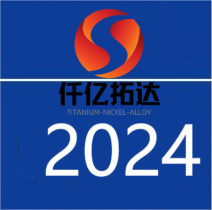Beta-C Titanium Alloys: Applications and Benefits in High-Temperature Environments.
[ 信息发布:本站 | 时间:2024-03-13 | 浏览:531 ]
Beta-C Titanium Alloys: Applications and Benefits in High-Temperature Environments
.
Beta-C titanium alloys are a class of titanium alloys characterized by the presence of the beta phase (β-phase) in their microstructure. These alloys typically contain beta-stabilizing elements such as molybdenum, vanadium, chromium, and niobium, which promote the retention of the beta phase at room temperature and higher temperatures. Here are some applications and benefits of beta-C titanium alloys in high-temperature environments:
-
Aerospace Components: Beta-C titanium alloys are commonly used in aerospace applications, particularly in components subjected to high temperatures and mechanical stresses, such as turbine blades, compressor disks, and airframe structures. Their high strength-to-weight ratio, excellent creep resistance, and thermal stability make them ideal for these demanding environments.
-
Gas Turbine Engines: In gas turbine engines, which operate at elevated temperatures, beta-C titanium alloys offer superior performance compared to other materials. Their ability to maintain strength and mechanical properties at high temperatures, combined with excellent oxidation and corrosion resistance, makes them suitable for critical engine components like turbine blades and vanes.
-
Automotive Exhaust Systems: Beta-C titanium alloys find applications in automotive exhaust systems, where they are used to fabricate components such as exhaust valves, turbocharger components, and exhaust manifolds. Their high temperature resistance and corrosion resistance enable them to withstand the harsh operating conditions encountered in exhaust systems.
-
Chemical Processing: Beta-C titanium alloys are used in chemical processing applications where exposure to high temperatures and corrosive environments is common. They are employed in equipment such as reactors, heat exchangers, and piping systems, where their corrosion resistance and high temperature strength help maintain reliability and performance over extended service periods.
-
Medical Devices: Beta-C titanium alloys are also utilized in medical devices and implants, particularly those requiring high strength and biocompatibility. Examples include orthopedic implants, surgical instruments, and dental implants. Their ability to withstand sterilization processes and maintain mechanical properties in the body's high-temperature environment contributes to their suitability for medical applications.
Benefits of beta-C titanium alloys in high-temperature environments include:
- High Strength: Beta-C titanium alloys exhibit high strength and stiffness at elevated temperatures, allowing them to withstand mechanical loads and stresses without deformation or failure.
- Excellent Creep Resistance: These alloys have excellent creep resistance, meaning they can resist deformation under prolonged exposure to high temperatures and mechanical loads, making them suitable for long-term service in high-temperature environments.
- Good Oxidation and Corrosion Resistance: Beta-C titanium alloys offer good oxidation and corrosion resistance, protecting components from degradation in harsh environments and extending their service life.
- Lightweight: Like other titanium alloys, beta-C titanium alloys have a low density, providing a high strength-to-weight ratio that contributes to fuel efficiency and performance in aerospace and automotive applications.
Overall, beta-C titanium alloys play a critical role in various high-temperature applications where strength, durability, and corrosion resistance are paramount. Their unique combination of properties makes them an attractive choice for demanding environments across industries such as aerospace, automotive, chemical processing, and healthcare
